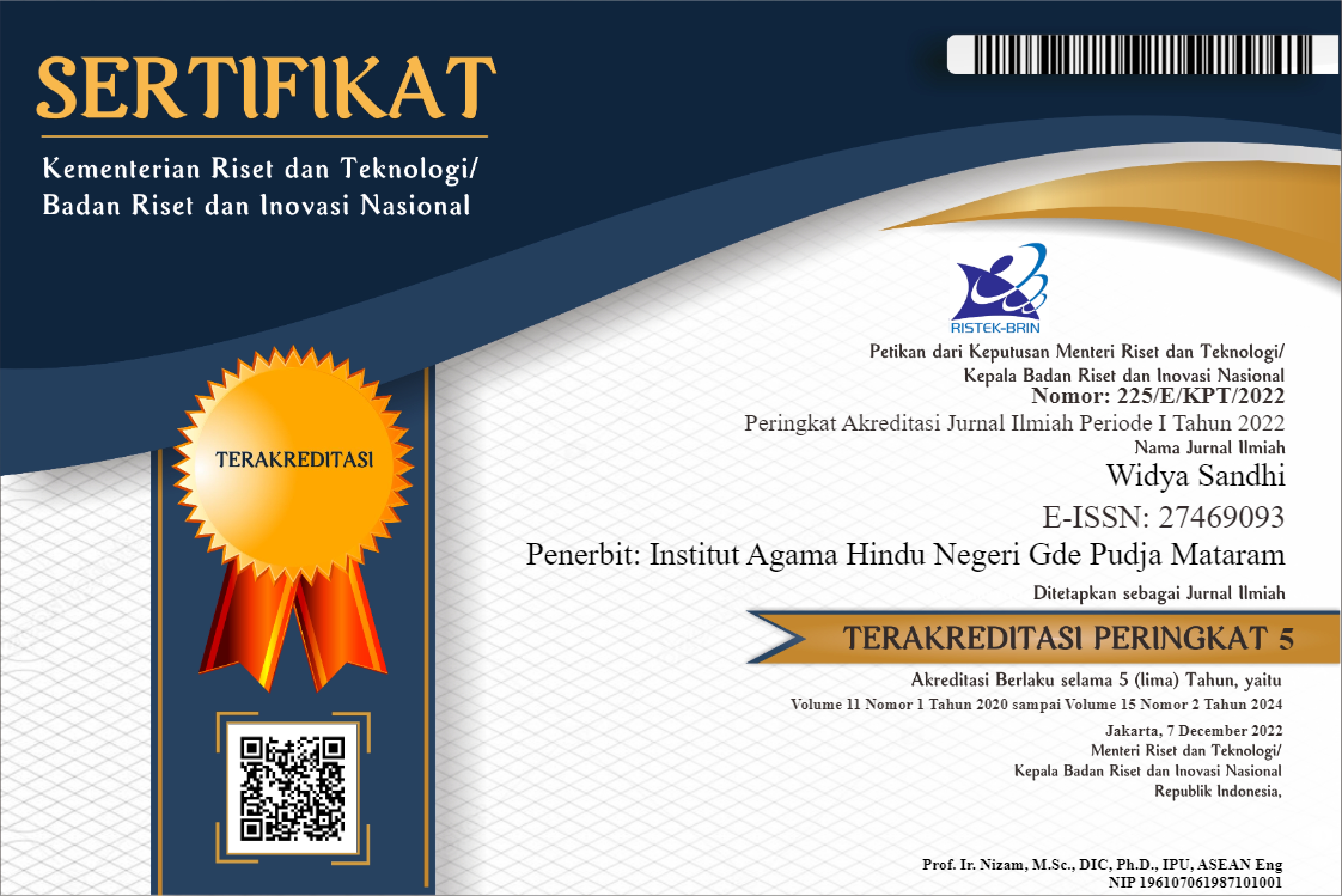Informal Education Of Dharmika Women In Transforming Hindu Religious Values Toward Children In Banjar Tri Parartha Mataram City
Abstract
This study aims to examine informal dharmika women education in transforming Hindu religious values to their children at Banjar Parartha Perumnas Karang Permai, Sekarbela Subdistrict, Mataram City. This research was designed in a qualitative descriptive type using a case study model. Based on the results of this study it was found that the efforts of dharmika women in transforming Hindu religious values for their children in the family through several strategies. First, cooperation between husband and wife to be able to provide knowledge and at the same time be able to transform Hindu religious values for children in the family. Second, the husband and other family members must overcome the psychological pressures of dharmika so that later in carrying out the marriage ark they will feel happy. Third, studying Hinduism can be done through the internet and books about Hinduism also from members of the banjar. Fourth, directing their children to be more able to explore Hindu religious lessons at school, while the means of ceremonies and ceremonies as well as their implementation are self-taught.
References
Arifin, I. (1989) Penelitian Kualitatif dalam ilmu-ilmu social dan keagamaan. Malang; Kalimasahada Press
Departemen Agama RI, (2001) Modul Keluarga Bahagia Sejahtra; Jakarta
Harnika, N. N. (2021). Efektifitas Komunikasi Persuasif Penyuluh Agama Hindu Non PNS Dalam Membina Keluarga Dharmika Di Kota Mataram. Ganec Swara, 15(2), 1140-1146.
Jaman. I Gede. (2008) Membina keluarga sejahtra. Surabaya; Paramita
Mas,A.A Gede raka. (2002) Perkawinan Yang Ideal. Surabaya; Paramita
Moleong. Lexi.J. (2005) Metode Penelitian Kualitatif.ramaja Karya
Sudharma.Made. (2014) Pendidikan Agama pada keluarga Hindu yang Melaksanakan perkawinan Beda Agama di STAHN Gde Pudja Mataram
Supriyanto.(2011) Pendidikan Orang Dewasa. Jakarta;Sinar Grfika
Kadjeng Nyoman, (1971) Sarassamuscaya, Proyek Penerbit Kitab Suci Hindu
Kadarusman, (2005). Agama, relasi Gender dan feminis. Yogyakarta; Kreasi Warna
Shomuddin. (2022) Pengantar Sosiologi Agama. Malang;Ghalia Indonesia
Titib, Made. (1999) Perkawinan dan Kehidupan Keluarga Menurut Kitab Suci veda. Paramita; Surabaya
Raka. (2008). Menjadi Orang Tua Mulia & Bahagia. Paramita; Surabaya
Undang-Undang Republik Indonesia Nomor 1 tahun 1974 tentang Perkawinan ( Lembaran Negara republik Indonesia tahun 1974)
Peraturan pemerintah Republik Indonesia Nomor 9 Tahun 1975 tentang pelaksanaan Undang-Undang Nomor 1 tahun 1974 tentang perkawinan
Pudja, Gede dan Tjokorda Rai Sudhaarta: (2004) Manawa Dharma Sastra (Manu Dharmasastra) atau Veda Smrti Compendium Hukum Hindu. Paramita; Surabaya
Suhardana, K.m (2007) Tri Kaya Parisudha Bahan kajian Berfikir Baik, Berkata Baik dan Berbuat Baik. Paramita; Surabaya
Rahmawati, Ni Nyoman. Upacara Sudhi Wadani dalam Perspektif Hukum Hindu. Jurnal belom bahadat Vol III 1 April 2013
Natih, Ni Ketut, dkk. (1980) Pembinaan Perkawinan Agama Hindu. Yayasan; Dharma Kerti; Jakarta
Titib. I Made (2003). Veda Sabda Suci; Pedoman Praktis Kehidupan. Paramita; Surabaya
Tim penyusun: (1988). Tuntunan pelaksanaan Sudhi Wadani. Departemen Agama RI Jakarta
Wirawan, I. W. A., Purwanto, S. E., Widana, I. N. M., & Sumada, I. K. (2023a). Conservation of the forest ecosystem based on the memarek tradition at multireligious communities in Bebekek. European Chemical Bulletin, 12(4), 3604-3617.
Wirawan, I. W. A., Arsana, I. M. A. Y., & Arini, N. M. (2023b). The influence of spiritual quotient and social competence on intercultural sensitivity and their impact on attitude of religious moderation at adolescents in Mataram City. Research Journal in Advanced Humanities, 4(2).

This work is licensed under a Creative Commons Attribution-NonCommercial-ShareAlike 4.0 International License.
Authors who publish with this journal agree to the following terms:
- Authors retain copyright and grant the journal right of first publication with the work simultaneously licensed under a Creative Commons Attribution-ShareAlike 4.0 International License. that allows others to share the work with an acknowledgment of the work's authorship and initial publication in this journal.
- Authors are able to enter into separate, additional contractual arrangements for the non-exclusive distribution of the journal's published version of the work (e.g., post it to an institutional repository or publish it in a book), with an acknowledgment of its initial publication in this journal.
- Authors are permitted and encouraged to post their work online (e.g., in institutional repositories or on their website) prior to and during the submission process, as it can lead to productive exchanges, as well as earlier and greater citation of published work (See The Effect of Open Access).






.jpg)




